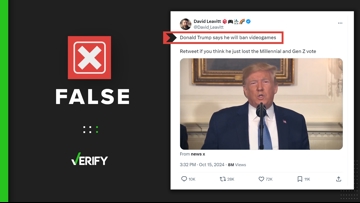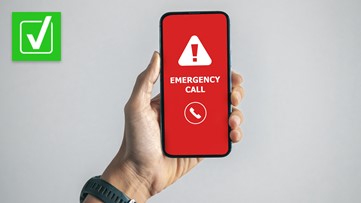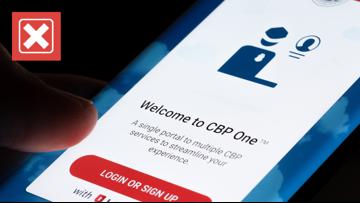A social media post spreading online claims that if you are in an emergency situation where you’re unable to talk, for example if you’re choking or an intruder is in your home, you can call 999, press 55 and the police will be dispatched to you.
VERIFY reader Aimee reached out to ask if calling 999 and pressing 55 actually works to get help without talking.
THE QUESTION
Is it true that you can dial 999 and then press 55 to receive emergency help when you are unable to speak?
THE SOURCES
THE ANSWER
The United Kingdom has a silent call procedure where you can dial 999 and press 55 to be transferred directly to police when you are unable to speak. But this does not work in the United States, as 911 is the emergency number and there is no national silent call number.
WHAT WE FOUND
999 is an emergency phone number in numerous countries, including the United Kingdom. Calling 999 and pressing 55 from a cell phone will connect silent callers to the police, as the post claims, but this only works in the U.K. In the United States, the emergency number is 911, not 999, and there’s not a similar nationwide silent call extension.
Dialing 999 then 55 will only work in the U.K.
The Metropolitan Police in London say if a 999 caller on a mobile phone dials 55, the call will be transferred to the police. If you don’t press 55 and remain silent when calling from a cell phone, the operator will end the call. If a caller on a landline doesn’t say anything during a call, the 999 operator will automatically transfer the call to the police.
Both West Yorkshire Police and Metropolitan Police say calls from mobile devices cannot be tracked, so police will not automatically be dispatched. But if calling from a landline, the police will have information about the location and will know where to send police.
This procedure was created to “filter out large numbers of accidental or hoax 999 calls,” the Independent Office for Police Conduct says.
The added option to select 55 lets responders know that the caller isn’t speaking because they are in a real emergency, not because they dialed by accident.
Once you are transferred to the police, “the call handler will attempt to communicate with you by asking simple yes or no questions,” the Independent Office for Police Conduct says. If you aren’t able to speak, the Office recommends you “listen carefully to the questions and instructions from the call handler so they can assess your call and arrange help if needed.”
West Yorkshire Police in the United Kingdom say a variety of methods are used to get information from callers who may not be able to speak, such as “tapping the handset in a way that answers the call handler’s questions,” or “skilled use of closed questions (yes or no).”
911 is the only number that should be used for emergencies in the U.S.
Callers in the U.S should never dial 999 in an emergency, only 911.
In the United States, if you call 911 and are unable to speak, first responders are trained to actively listen to assess the situation the caller is in, April Heinze, National Emergency Number Association 9-1-1 Operations Director explains.
Though there is no national “silent help” protocol, there may be regional extensions available in certain areas.
For example, Massachusetts has its own 911 silent call procedure where a caller can press digits on their phone keypad to signal what emergency service they need. After dialing 911, you can press 1 if you need the police, 2 if you need fire services and 3 if you need an ambulance. Four and 5 are used for yes and no, respectively.
This feature is not available nationwide, though. This is because 911 is run by local organizations or state governments, Heinze explains.
There is a service called Text-to-911, which allows access to 911 dispatchers by text. The service is actively expanding, but is not yet offered everywhere.
The FCC has a list of call centers that currently offer the text-to-911 service on their website. The current voice-based 911 service is still the most reliable and preferred contact, the FCC says.
The Federal Communications Commission says you should “always contact 911 by making a voice call, if you can.”













